
Obituary: Rabbi Dovid Schochet, 91, Towering Architect of Jewish Life in Toronto
by Menachem Posner – chabad.org
Toronto was not always the epicenter of traditional Jewish life in Canada that it is today, with an abundance of kosher restaurants, kollels, synagogues and yeshivahs lining Bathurst Street for miles, reaching north into the ever-growing Toronto metropolitan area.
Much of the boom in traditional Jewish life in Toronto began in the 1950s, in great part due to the leadership of Rabbi Dovid Schochet, the revered rabbi, halachic authority and staunch defender of Jewish law and values who helped guide the city with strength and love for 66 years.
Rabbi Schochet passed away in Toronto on Sunday evening, 19 Shevat, (Feb. 28). He was 91 years old.
Dr. Robert Harris, a scholar of the history of 19th-century Russian ideas at the University of Oxford, was among the first students at the after-school cheder where Rabbi Schochet served as director, principal and teacher, decades before he would become a member of the Central Committee of Chabad-Lubavitch Rabbis in the United States and Canada, and grant rabbinical ordination to hundreds of students.
“I was a little late in the beginning and behind my peers when I first came,” Harris told Chabad.org. “Rabbi Schochet put his arm around my shoulder, sat with me and had me repeat Aleph, ah, Beis, bah, Gimmel, gah. Once I did that, he told me that the lesson was done and that I should tell my mother I had done well. At that time, I had no idea how special it was for a person of his intellectual stature to invest himself so fully into the world of a little boy who was having a hard time in Hebrew school.”
Harris says that this continued through his years at the cheder. “On Chanukah, he didn’t just give us dreidels; he sat and played with us. And on Sukkot, he’d sit and eat in the sukkah with us. We sometimes saw him learning Talmud with the adults, and as an adult, I came to appreciate what a great intellect and scholar he was, but to us, he was there just for us, entirely focused on our world.”
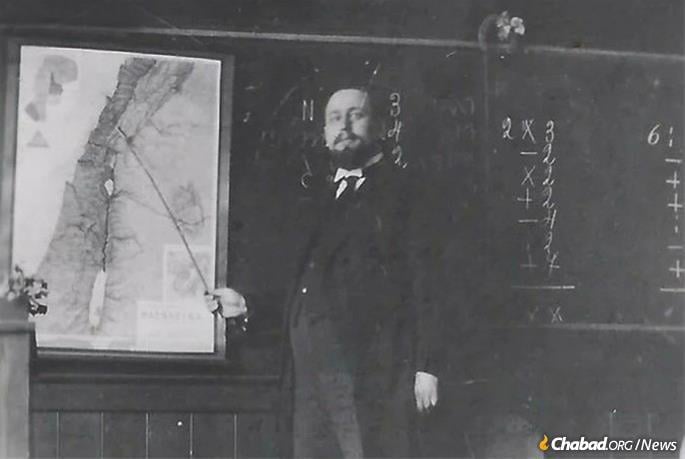
A Legacy of Torah Scholarship
Born in 1932 in Basel, Switzerland, Dovid Schochet was the eldest of nine siblings. His father was Rabbi Dov Yehuda Schochet, an alumnus of the Telshe Yeshivah who became a leading rabbi and Torah teacher. His mother, Sara Sosha Schochet, was the sister of Etel Hodakov. Etel’s husband was Rabbi Mordechai Isaac Hodakov, an outstanding teacher and pedagogue who as a very young man was appointed principal of the Torah Ve-Derech Eretz school in Riga, Latvia; served as a member of the Riga City Council; and later charged with directing the Jewish department at the Latvian Ministry of Education.
Soon afterward, Hodakov was called upon by the Sixth Rebbe—Rabbi Yosef Yitzchak Schneersohn, of righteous memory—to apply his talents to building religious and educational institutions in America, and later became chief of staff to the Rebbe—Rabbi Menachem M. Schneerson, of righteous memory.
When Dovid was around 15 years old, his family moved from Switzerland to Holland, where his father served many Holocaust survivors who settled there after the war.
The need to provide their children with a proper Torah education drew the Schochet family to Toronto, where Rabbi Dov Yehuda had been assured a position appropriate for his stature as a leading scholar. Yet things did not go according to plan, and he soon found himself teaching day-school students, a calling that he took to with gusto and where he found great success.
Nineteen years old and in need of a proper yeshivah, Dovid joined the central Chabad yeshivah in Brooklyn, N.Y.
His decision to learn in the Chabad yeshivah came in part because of the influence on him of his uncle, Rabbi Hodakov. But, as he would later recall in an interview with JEM’s “My Encounter Project,” “what really decided me was the pride in being Jewish that the Lubavitcher Chassidim exhibited. Lubavitcher Chassidim openly wore yarmulkes and even went on the streets with the strings of their tzitzit hanging out. That impressed me very much.”
The young scholar arrived in New York barely a year after the Rebbe had formally accepted the leadership of Chabad, and Dovid frequently received the Rebbe’s guidance and support.
In their very first meeting, the Rebbe told him, “Don’t take life for granted. In the morning, when you wake up, thank G‑d for everything that has been given to you.”
The Rebbe went on to say that many people go to sleep at night and expect their shoes to be by their bed where they left them the night before when they wake up in the morning. As they get dressed, they complain that the weather is too cold or hot. “In effect, they are criticizing G‑d,” the Rebbe said, “because who makes the weather? Instead, they should be grateful that they are still alive, that their possessions are still with them, that a new day is beginning where they have an opportunity to do many good deeds.”
During that very same audience, the Rebbe also advised Dovid to take a career in Jewish education. As he later recalled, “I had been planning to enroll in university after finishing my yeshivah studies with the intent of becoming an electrical engineer, but the Rebbe said that I would find working in Jewish outreach much more rewarding because, as he put it, every Jew is a diamond.”
In time, he became a staunch student of the Chabad way of life, and following his lead, many of his younger siblings came to Chabad as well.
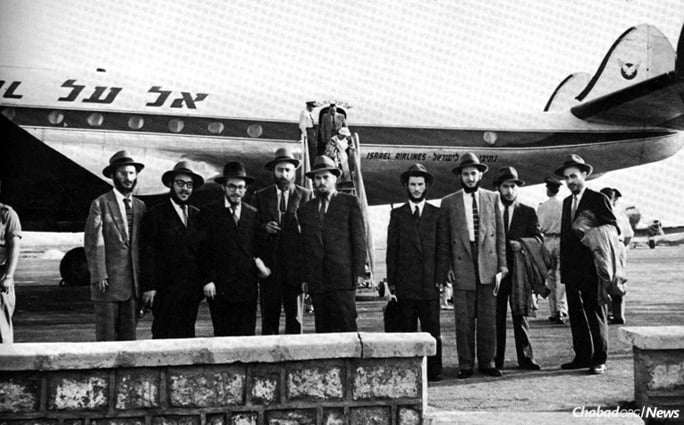
Marriage and Communal Leadership
In 1956, Arab fedayeen (terrorists armed and trained mostly by the Egyptian government) entered and attacked the Chabad village in Israel, Kfar Chabad, leaving five children and one teacher dead, murdered in cold blood while they prayed.
The Rebbe responded by dispatching a group of 12 prized rabbinical students to Israel as his emissaries. Their goal was to comfort and encourage the residents of Kfar Chabad and the Holy Land.
Dovid was among them. While on the trip, he was introduced to Bat-Sheva Sudak, whose family had been among those who escaped the Soviet Union after toiling for decades to uphold Jewish life there despite the vicious Bolshevik repression.
The Rebbe officiated at their wedding just before Passover of 1957.
Once married, the young couple relocated to Toronto to serve as the Rebbe’s emissaries.
At that time, the Rebbe told the young man that his mission was to make Toronto a Chassidic center, not just for Canada but for the whole world.
They settled in the Downsview neighborhood, then the city’s center of Jewish life, and quickly established a synagogue.
In an era where many of the staple Chabad programs had not yet been developed, they needed to innovate. Some of the early programs included having Jewish children from secular homes spend Shabbat with observant families and arranging Torah classes for teens.
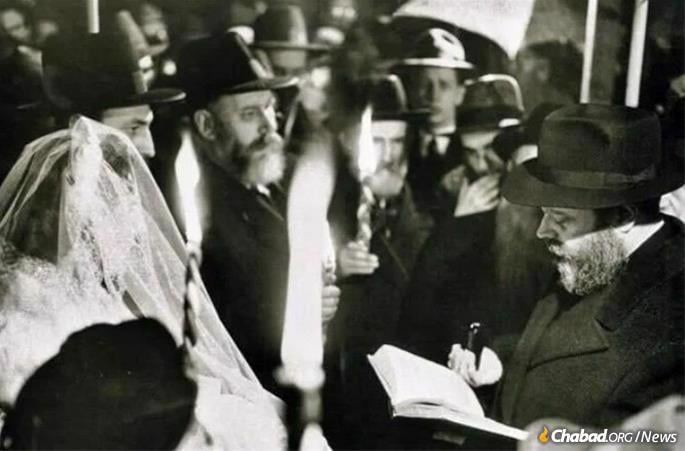
Raising Up Individuals
In those days, the Jewish infrastructure in Toronto was nebulous; even kosher milk and glatt kosher meat were difficult to come by, and many kosher staples had to be brought in from New York.
“I do not think many people understood what the rabbi was working to accomplish and how he would really get things off the ground,” says Harris, whose mother, Anne Harris, served as the secretary at Lubavitch of Toronto. “He did everything himself then. He would get frustrated sometimes, but he did not give up!”
As the Schochets planted and carefully tended the seeds of Jewish growth in the city, they also watched the community move northward, away from the crowded city center. And so they moved to the then-emerging community of Thornhill, where he became rabbi at the newly established sprawling Chabad center on the corner of Bathhurst and Chabad Gate, which has anchored the community ever since.
Rabbi Schochet was a person of the people, available at all hours of day and night, ready to provide comfort, sage advice and a listening ear.
“I went to him with all my hardest personal questions,” says Dr. Michael Chighel, who lived in Toronto for many years, “And also some silly ones. Questions about the Rebbe’s role, about intimacy, about my father, about my car keys. He was never impatient with me.
“I loved sitting in his seforim-walled basement on Milner Gate for his Shabbos afternoon Pirkei Avos class, listening to his heavily accented baritone. It was transporting. Rumblings of Mount Sinai softly reverberated in his voice. It’s impossible for me to describe or even evoke the greatness of Torah I sensed in him. Sensed, because there was so much I did not understand, didn’t actually fathom.
“But even harder to portray is the faith he embodied and radiated. He saw HaShem’s presence in the way we see sidewalks and traffic lights and trees. He spoke about HaShem with such extreme simplicity that it was terrifying and comforting at the same time.”
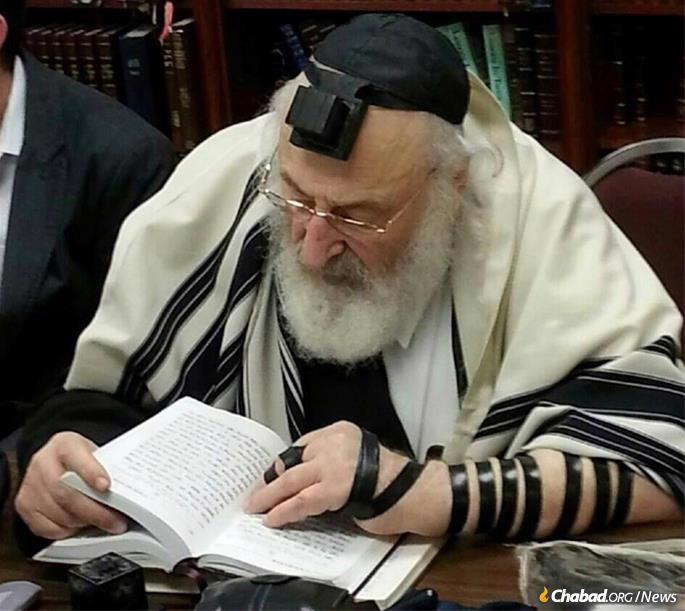
Yet even as he guided his flock of individuals, he was also heavily involved in building up the Jewish infrastructure of the city, where he served as president of the Vaad Harabonim (Rabbinical Council) and as chief rabbi of the Chabad community.
His Torah guidance was also felt on the international scene. He served for decades as a member of the Central Committee of Chabad-Lubavitch Rabbis in the United States and Canada and granted rabbinical ordination to hundreds of students over the years.
He passed away on Sunday evening, 19 Shevat, at the age of 91, in Toronto, after an illness.
In addition to his wife, he is survived by their children: Rabbi Yossi Schochet (Toronto); Batya Lisker (Miami); Rochie Diena (Toronto); Chana Weisberg (Pomona, N.Y.); grandchildren and great-grandchildren.
He is also survived by his siblings, Ruth Averbuch (Brooklyn, N.Y.); Batya Wagner (Toronto); Rabbi Joseph Daniel Schochet (Toronto); Rabbi Ezra Schochet (Los Angeles); Rabbi Elisha Shochet (Toronto); Rabbi Ovadia Schochet (Miami); and Amina Newman (Long Beach, Calif.).
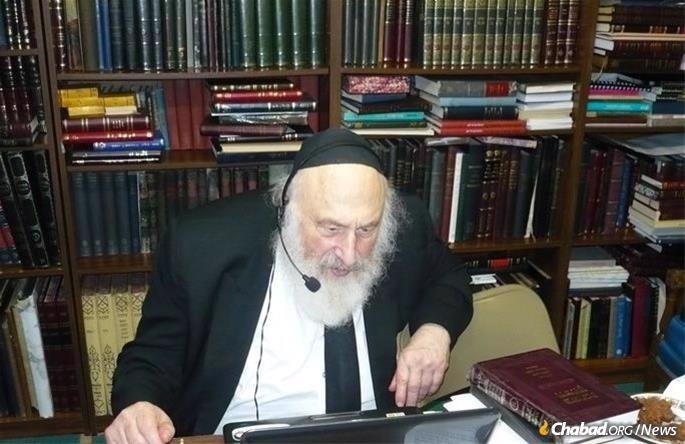











Sharon thorley and Rick Harris.
So sorry to hear of the Rabbi’s passing.
Both of us studied under him and personally I can’t think of a person I respected more than Rabbi Schochet. He will be missed.